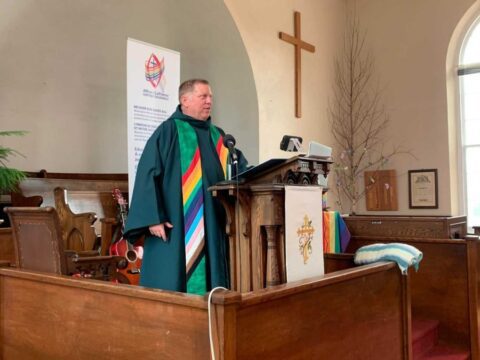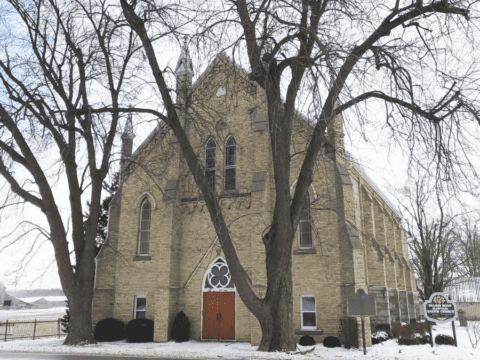There’s anger and pain in the ranks of United Church clergy after they’ve learned future raises will not be tied to inflation, with some clergy seeing it as proof the church does not value them.
“The United Church of Canada has a very, very difficult time articulating that it values its clergy, and especially its educated clergy,” said Rev. Dianne Everitt, pastor at Bethany United in Attercliffe Station, Ont. “It has a hard time holding up its ordained ministers as having worth and value to the church.”
You may unsubscribe from any of our newsletters at any time.
Clergy learned of the future change to their annual pay adjustment, the Cost of Living Allowance, from a letter United Church General Secretary Rev. Michael Blair sent Sept. 25. The letter said the increase would be “delinked” after 2024 from the Consumer Price Index (CPI), which has long been the standard used to set most COLAs. Ministers are to receive a 6.3 percent increase in 2024, in accordance with the previous policy, but for the last time. United Church General Council Office and Regional Council Office staff will receive a two percent increase.
“This is just another kick in the head,” said Rev. Alison Miculan, minister at Copetown United and Jerseyville United churches in Ontario and organizing chair of Unifaith, a movement to unionize United Church clergy. “We’ve just gone through this really, really harrowing time where we really did not feel supported,” she said, referring to the pandemic shutdown.
Miculan said her “phone blew up” as clergy read the letter. “The irony is not lost on us as clergy that October is Clergy Appreciation Month.”
Many clergy say this decision came out of the blue, and that there was no consultation. Blair confirms this.
“No, no employer consults with their staff about salary increases. We are not a union shop, so we don’t have those kinds of conversations,” he said. Blair added that he had not considered talking to clergy beforehand to let them know a change was coming.
“They have a year’s notice so it’s not like it’s happening today,” he noted.
For 22 years, the CPI was the only factor the United Church used in setting clergy and staff’s COLA, Blair explained. At its September meeting, the General Council Executive decided CPI would not be the only factor after 2024, he said, adding that the group has been asked to report back, before the 2025 budget, with a formula to set the COLA.
Some ministers blame the 2019 church governance restructuring for taking away their voice. Where there were once four levels of church governance – congregation, Presbytery, Conference and the General Council – now there are three with Presbyteries and Conferences merging into regions.
More on Broadview:
- United Church to share new national office space with Anglican and Presbyterians
- United Church camps forced to cancel summer 2023 programs due to staff shortages
- The United Church’s numbers have dropped more than any other denomination
“The restructuring has created a situation where far fewer people are making all of the decisions. And that’s one of the things actually that has gotten people riled up about this situation because there’s no transparency. There’s no democratic process anymore,” Miculan said. “The involvement of the clergy is slim to none.”
That is one of Everitt’s concerns also. “These decisions are just a fait accompli, given to us as an informational news bulletin that the decision has been made… and made by generally very highly paid General Council staff,” she said.
Rev. Cheri DiNovo, minister at Trinity-St. Paul’s United Church and Centre for Faith, Justice and the Arts in Toronto, share those concerns. She said the implied message is that congregations don’t have to pay their minister a fair wage, which she finds alarming.
“They’re driving a wedge between the clergy and their congregation. It’s, ‘Hey, here’s where you can save some money. Pay your clergy less,’” she said. “Maybe it’s because we’re mainly women. Maybe they’ll just see it as a second income (in a family) so they don’t have to pay us well.”
A recent “Leadership Counts” survey asked ministry personnel to share their identity markers. Just over half of active ministry personnel and candidates responded with 47 percent identifying as women, according to the survey’s mid-term report, released this month.
Blair said it is important to note that the local congregation pays their minister’s salary. “Ministers can negotiate, and the rules allow them to negotiate their compensation. But our task is to set the minimum salary,” he said.A recent
Micualan, Everitt and DiNovo say they fear for the future of the United Church as it closes churches at a rate of two per week. DiNovo likens the denomination closing churches to a business closing stores.
“If I were running a business where I was closing two outlets a week across the business, and I was looking at being out of business in 20 to 25 years, I might call it a crisis… And one of the first things [that needs to happen] is to talk to all the clergy. You’d be looking at solutions and looking at — how are we going to save these outlets?”
Correction: In a previous version of this story, Broadview incorrectly attributed the decision to delink the annual economic adjustment (COLA) to a task group. The error has been corrected in this version.
***
Julie Carl is Broadview’s United Church in Focus Editor.














Negotiate with the congregation eh. As Dr. Phil would say, “how’s that workin’ for ya?”
In my experience it would not have been working well. I’ve always wondered how it is that some ministers with little education get paid pretty much the same as ministers with seven years education with two or more degrees.
The things a minister learns are not appreciated and there are always those in the congregation who feel that the minister is literally their servant and should be paid as a servant. I think I retired just in time. Since the new organization it seems as if the church is going down hill.
As a clergy person, I’m very aware of the struggles of my colleagues, but also aware of the struggles of average Canadians. Are the people living in tents across this land going to get a cost of living increase? Are the people working multiple jobs to make ends meet at minimum wage going to have their income tied to the rate of inflation? Are the nurses and teachers who have suffered so much through Covid seeing a cost of living increase? As much as I appreciate the sentiment of fair play, I wonder how we can keep in touch with our parisioners who are struggling if we don’t share in the same challenges they face. Consider me torn rather than outraged.